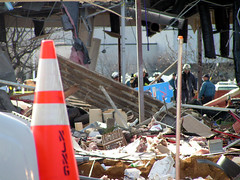One of the most interesting things that I learned in my Red Cross training, for whom I occasionally do pro bono work, was about the emotional responses and phases that disaster survivors feel in the days and years after a crisis has affected their lives.
Part of what I love about public relations is that in order to be effective, you have to be familiar with and pull from many other disciplines – psychology is one of these.
Psychologists call the emotional stages of survivors the Four Phases of Disaster:
1. Heroic Phase: This phase usually occurs directly after the disaster, when heroic actions are taken to help people recover from and/or survive a disaster. The media may be just arriving on the scene or not yet arrived at this phase.
2. Honeymoon Phase: In this phase people draw together to solve problems in an intense showing of community. Media interest is intense during this phase. This phase generally lasts from one week to six months.
3. Disillusionment Phase: People begin to get a mentality of “everyone for himself” when delays and other issues common with disaster set in. About this time media interest begins to fade and blame is assigned. This phase could extend from two months to one or more years.
4. Reconstruction Phase: People start to pull together again to get things done, delays in the process continue to garner negative feelings and reactions. The media may revisit the disaster at this time (one-year anniversaries, etc.)
If you understand these phases, then you will not be surprised when in the honeymoon phase, your community or employees might be initially very appreciative of any aid and responsiveness you provide, when in the disillusionment phase, they might react very differently –assigning blame and generally being very critical.
If your company is responsible for the disaster, the progress you make to address the problem in the honeymoon phase, or the first week to six weeks, will be critical to the treatment you get in the disillusionment phase, which is sure to come.
I would argue with the speed of communication that the first week is critical to complete communication and a formulation of the plan, while the remaining five weeks are critical to the delivery of the plan, or at least a major start to it.
We need to build these phases into our crisis communication plans and be prepared to respond accordingly.
Tags:
